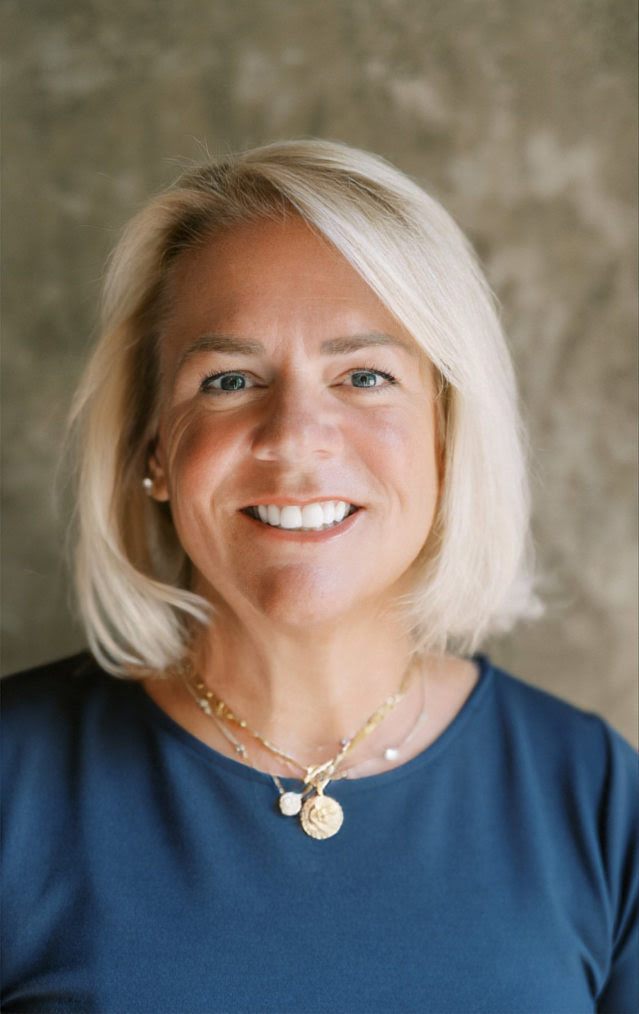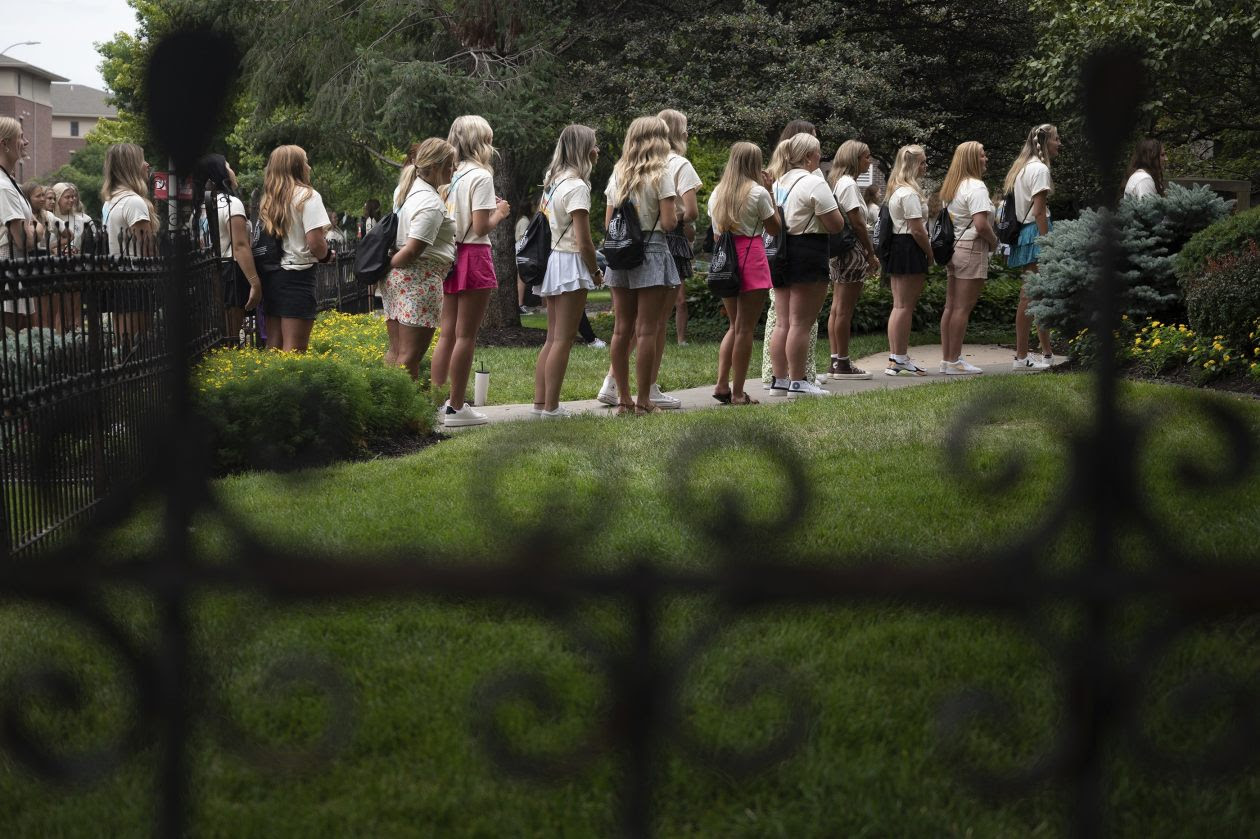Getting into sororities is nearly as tough as entry to top universities; ‘Be trendy but not too trendy, modest but not too modest, fit in but be unique’
Sorority rush at the University of Georgia kicks off in August, a lousy time to wear makeup.
“You need to do it in a way that’s appropriate in southern humidity or else you’re going to have orange rivers running down your face,” said Trisha Addicks. She recommends keeping a “rush bag” with deodorant, portable fan, water and face powder.
That’s the kind of practical advice Addicks gives clients of her Georgia-based sorority-consulting firm, It’s All Greek to Me. Showing up in Dr. Martens combat boots, as one client asked about, might not be putting your best foot forward in some sorority circles, she said: “During rush, you’re not going to be confident if you’re wearing them, and everybody else is wearing espadrilles.”
Addicks offers a $600 seminar for women and their mothers to learn the basics about getting into a sorority; $3,500 buys unlimited access to sorority mentors who advise aspirants through every step. She is part of an industry emerging in recent years that sells tips and emotional support to women who want to avoid missteps that threaten first impressions. Sorority consultants cover such topics as what to wear, how to act, what to say and the wisdom of scrubbing potentially off-putting social media posts.

Shannon Rust, in an outfit curated by her sorority consultant, at the University of Georgia in Athens, Ga., during rush. Photo: Elizabeth Payne
Emma Kelley, a recent graduate, said hiring Addicks was worth it. Otherwise, she risked entering blind to the arcane rituals, traditions and unspoken rules of Greek life. “You have to be trendy but not too trendy, modest but not too modest, fit in but be unique,” said Kelley, who joined the University of Georgia’s Delta Zeta sorority. The trick, she said, is “blending in and standing out.”

Stacia Damron, founder and CEO of Hiking in Heels. Photo: Bridgette Bloomquist Photography
Getting into sororities has become nearly as competitive as acceptance to top universities. Applicants are asked to write essays, give their grade-point average and report whether they did volunteer work or played high-school sports. Women submit application packets with as many as 30 letters of recommendation, said Stacia Damron, owner of Hiking in High Heels in Texas. Some sororities require that applicants record video responses to their questions. “My boyfriend went to Stanford, and he said this is more complicated than getting a Stanford M.B.A.,” she said.
Damron tells clients that they need a social-media presence but warns that sorority members will scour a recruit’s posts. She suggests that women erase images of themselves in very skimpy outfits or with alcohol. Instead, they should pile up posts about family, friends, hobbies and volunteer work. “It’s about telling a story to help the sororities get to know you,” said Damron. Her fees run as high as $4,000 for on-call service during rush.

Sorority consultant Trisha Addicks Photo: Paige Molina Photography, Atlanta
Leighton Newberry, owner of Recruitment Ready in Atlanta, said she spends a lot of time prepping young women for conversation. All the hours young people spend texting and communicating over social media has left many inexperienced with face-to-face chitchat, she said. Newberry, who graduated from Auburn University in 2019, advises her clients to make eye contact and stay engaged with new acquaintances during rush season’s many social events. She suggests asking questions: Where are you from? Why did you pick this school to attend?
Newberry has a la carte sessions that cost $150 for video calls and $175 for in-person meetings. She also sells the Bid Day Bundle for $1,000. That includes three one-on-one sessions and assistance writing résumés and cover letters, as well as styling tips. She also gives frank talk about disappointment.
“You’re not going to get what you want all the time,” Newberry said. “These are life skills that can carry with them for years to come. It’s not just about getting into one sorority.”
Last year, 125,000 women sought a spot in sororities at the 500 campuses that provide data to the National Panhellenic Conference, and between a quarter and a fifth of them either quit or didn’t get accepted, according to Dani Weatherford, chief executive of the National Panhellenic Conference, a trade group that represents sororities. Generally, sororities conduct four rounds of meetings with applicants and winnow the group after each round.
Advertisement – Scroll to Continue
The $2,000 Fabulous and Chic package from Greek Chic in Manhattan provides four sessions on applications, social media and wardrobe, along with ’round-the-clock counseling during rush week. Owner Lorie Stefanelli recalled being at a rooftop concert when she got a call from a distraught client at the University of Texas, Austin. The young woman, in tears, had successfully passed several rounds but felt too exhausted to keep going. Stefanelli said she left the concert to soothe her client, telling her she was doing a great job and encouraging her to continue.

Women lining up for a sorority tour last year at the University of Nebraska in Lincoln, Neb. Photo: Noah Riffe/Associated Press
Shannon Rust had to bounce back from a few rejections after leaving home in Stamford, Conn., to attend the University of Georgia last year. She had known little about sororities, and her roommate’s mother suggested Addicks, of It’s All Greek to Me. Shannon’s mother, Janine Rust, said she first thought that the idea of paying for a sorority consultant was crazy. But she went ahead and hired Addicks.
Rust said that after Shannon called her to say she had been cut from several sororities, she was more upset than her daughter was. “How could they not want my kid,” Rust recalled thinking. Then she picked up the phone and got consoled by Addicks.
“Having someone to be able to call 24/7 to talk me off the ledge was immeasurable,” Rust said.New members of Phi Mu en route to meeting with their sorority sisters last year at the University of Alabama in Tuscaloosa, Ala. Will McLelland/USA TODAY NETWORK/Reuters





